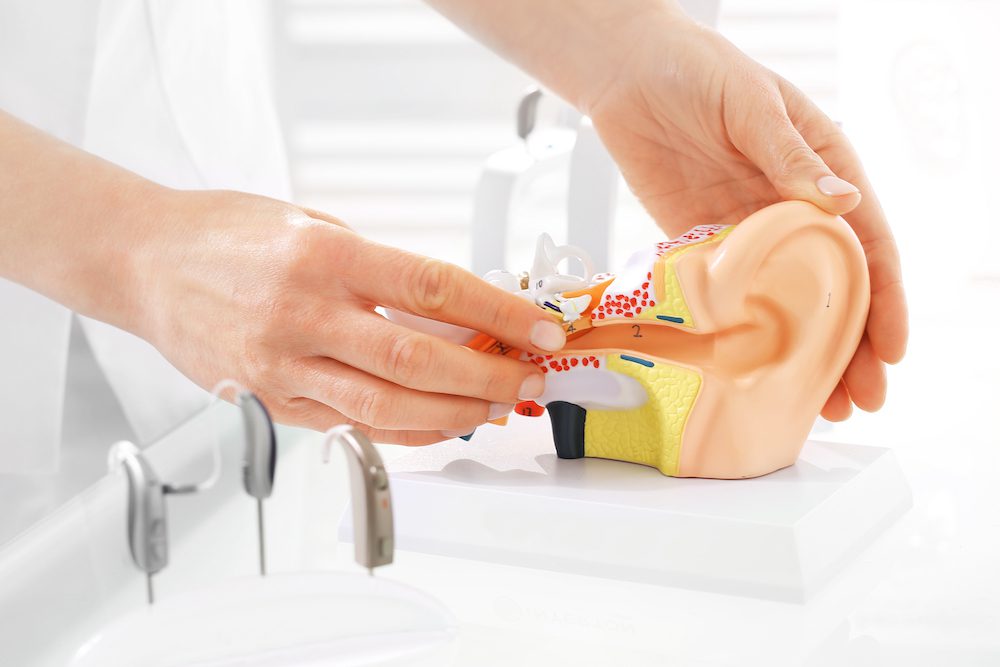The Challenges of Using Hearing Aids in Cold Weather
Winter is on its way, and with it comes a unique set of challenges for

By: admin | September 16, 2022
Although ear infections are more common in children than in adults, anyone of any age can experience temporary hearing loss if fluid and inflammation develop in the middle ear. Hearing loss caused by an ear infection, as well as other possible causes of hearing loss, will be discussed in-depth in this article.
A middle ear infection, also known as otitis media, develops when bacteria or a virus causes inflammation and fluid buildup behind the eardrum. A middle ear infection like this can cause temporary hearing loss.
The following are the two most common types of otitis media: When the eustachian tube, which connects the back of the throat to the middle of the ear, becomes inflamed, fluid can become trapped inside. This fluid has the potential to become infected, resulting in pain and swelling. This type of illness can sometimes result in hearing loss.
Medial otitis with effusion. Even after the illness has cleared, fluid or mucus may accumulate inside the eustachian tube. This fluid buildup might also make it difficult to hear well.
The following are examples of less common types of otitis media:
Because their eustachian tubes are narrower and fluid drains more slowly, ear infections are considerably more common in newborns and early children than in adults.
In fact, the National Institute on Deafness and Other Communication Disorders estimates that by the age of three, five out of every six children will have had at least one ear infection. Hearing loss caused by a middle ear infection is usually very transient. Once the fluid has drained from the middle ear, sound vibrations can no longer be transmitted.
The fluid, on the other hand, can remain for a long time. While the symptoms of otitis media normally go away within 48-72 hours, the fluid that has built up in the middle ear can last up to three months. While the fluid is trapped, you may have difficulty hearing clearly.
Hearing loss caused by an ear infection is usually very transient and goes away once the infection is treated. Antibiotics may be prescribed by your doctor to treat your ear infection. Your hearing should return to normal if the drugs properly treat the illness. If you have a history of recurrent ear infections, your audiologist may place a tube in your eardrum to aid in the drainage of the fluid.
The pain and pressure that typically accompany an ear infection can be relieved by removing the fluid buildup, which can also prevent the eardrum from rupturing. If the fluid does not drain, the pressure can cause your eardrum to burst.
Tympanosclerosis, or the thickening or scarring of the tympanic membrane, can be caused by a history of repeated ear infections. A ruptured eardrum and tympanosclerosis impair the eardrum’s mobility and lower hearing acuity. If your hearing does not improve after therapy, your audiologist may offer hearing aids to help with the unresolved hearing loss.
The eustachian tube connects the middle ear to the upper respiratory tract. It’s where the ear, nose and throat come together. Because of this link, germs from the nasal or sinus cavities can travel up the eustachian tube and into the middle ear, where they can begin to proliferate. The eustachian tube is shorter and thinner in youngsters, making it simpler for secretions to clog it.
Another ear infection that can cause hearing loss is the swimmer’s ear, often known as otitis externa. This is an infection that develops in the outer ear canal when water stays in the ear after swimming.
Due to congestion and fluid, ear infections can sometimes cause temporary hearing loss. It may feel as if you’re listening through fluid or hearing underwater when this happens. This sort of hearing loss is usually just brief and disappears once the infection is treated. However, if ear infections are not treated, they can cause speech and language difficulties, as well as, in rare circumstances, more permanent or long-term hearing loss. Sommerville Audiology & Hearing Aid Center may be reached at 586-298-3788 for more information.

Winter is on its way, and with it comes a unique set of challenges for
By: admin | January 31, 2024

When it comes to hearing aids, there are plenty available on the market,
By: admin | December 28, 2023

Ensuring your overall well-being involves making regular hearing tests a
By: admin | November 25, 2023
